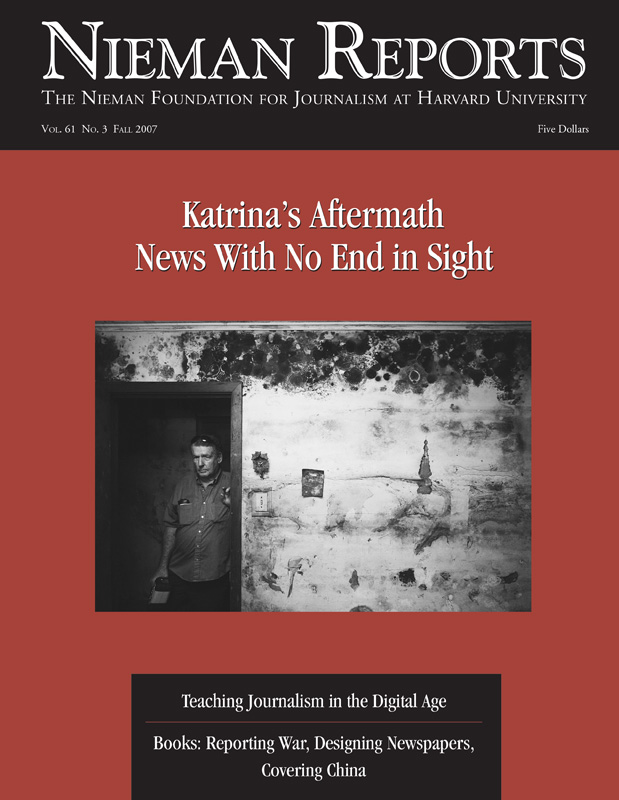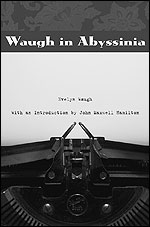Evelyn Waugh endeared himself to generations of journalists with “Scoop,” his comic trashing of foreign war correspondents. His main character, William Boot, and his episodes in the imaginary African kingdom of Ishmaelia have become touchstones for reporters grappling with the more ludicrous aspects of their craft, whether they are working the cop beat or Baghdad. At some point in our careers, we all have worked for “The Daily Beast.”
Now comes an ugly truth. Waugh wrote so perfectly about bad journalism because he was a bad journalist himself. He was biased. He was lazy. He made snap judgments and stuck to them, unwilling to explore the true motivations of the people about whom he wrote. He didn’t seem to really care that much about what he was covering, even something as profound and tragic as a war. Decades after “Scoop” entered the canon of fiction about our bruised profession, Louisiana State University (LSU) has reissued Waugh’s nonfiction twin to his famous novel, the long-forgotten “Waugh in Abyssinia.” The book is the first in LSU’s “From Our Own Correspondent” series of out-of-print books and never published manuscripts by foreign correspondents. First published in 1936, right after Italy’s successful conquest of Ethiopia, “Waugh in Abyssinia” is equal parts reportage, history, political analysis, and travelogue. This forgotten book provides great insight into foreign news coverage during Waugh’s time and raises questions about such reporting today.
The war between fascist Italy and Haile Selassie’s Ethiopia in 1935 and 1936 was a calamity, one of several crises that set the stage for the coming Second World War. Among other horrors, the Italians used mustard gas against their ill-equipped enemy in violation of international treaties. Yet Waugh demonstrates that none of the journalists sent to cover the war, least of all Waugh himself, had any real idea what was going on. In lieu of facts, which Waugh appears to have only half-heartedly attempted to collect, his personal prejudices dominate the book.
For Waugh, the Italo-Ethiopian War was more about his own lack of creature comforts than armies clashing. He never once saw a shot fired in combat. He spent most of his time in the Ethiopian capital instead of at the front. He only visited the Italian Army after it had controlled Ethiopia for months. A reader gets the impression that if the Ethiopians provided better hotel accommodations, he would have written a more favorable book.
The biggest problem modern readers will have, as did many British readers at the time it was published, is that Waugh backed the fascists. “Waugh in Abyssinia” would have, and probably did, make Mussolini smile. Waugh unabashedly embraced an imperial view that reeks of racist arrogance. Take this example from page 25: “However sordid the motives and however gross the means by which the white races established—and are still establishing—themselves in Africa, the result has been, in the main, beneficial, for there are more good men than bad in Europe, and there is a predisposition towards justice and charity in European culture; a bias, so that it cannot for long run free without inclining to good; things which began wickedly have turned out well.”
These lines were written only two years before the Nazi Kristallnacht and only four years before the eruption of a European war that would engulf the world. It’s only one example of Waugh, the tepid war reporter, not having a clue and not trying very hard to get one.
Former journalist John Maxwell Hamilton writes in his insightful introduction that “The problem was Waugh disdained journalism work.” Hamilton, dean of Louisiana State University’s Manship School of Mass Communication, writes that the atmosphere in Addis Ababa in the run-up to the war proved perfect for someone wishing to “ridicule rather than understand.”
And this general disregard for the professional task is the book’s importance. It’s a warning to modern reporters and readers. Waugh and the gaggle of reporters who covered the Italian invasion of Ethiopia trafficked in rumor with the voice of authority. (Waugh mocks this failing then commits the sin repeatedly himself throughout his book.) They discussed battles and troop movements with no idea of where, or if, they had taken place. (One journalist made up an entire battle.) “Scoop” was written to cast these absurdities into sharp relief. In many ways, “Waugh in Abyssinia”—the novelist’s attempt to produce serious reportage—accomplishes the same end.
Today foreign reporting is much better than in Waugh’s day—if for no other reason than technology and global competition have made it more difficult for mendacity to stand as long as it once did. Yet Waugh’s approach to foreign reporting has never fully left us. We still have our William Boots. Recently I heard a foreign correspondent asked about reporting from Darfur. He said it was awful: He couldn’t find a decent hotel near the refugee camps.
Evelyn Waugh’s book can’t be read without thinking of today’s wars and how reporters cover them. “Waugh in Abyssinia” puts the reports of insurgent deaths in Iraq or the capture of a “senior” Taliban commander in context. Think of the snarky Waugh, pen in one hand, cocktail in the other, jotting down his report as he sat miles from the battlefront.
The “From Our Own Correspondent” series states its purpose as follows: “illuminating the development of foreign news gathering at a time when it has never been more important.” Its first book is an excellent choice, illuminating the noble profession’s inherent weaknesses.
Cameron McWhirter, a 2007 Nieman Fellow, is a reporter for The Atlanta Journal-Constitution. He once freelanced in Eritrea and Ethiopia, and he says he took great measures to avoid other journalists while there.




